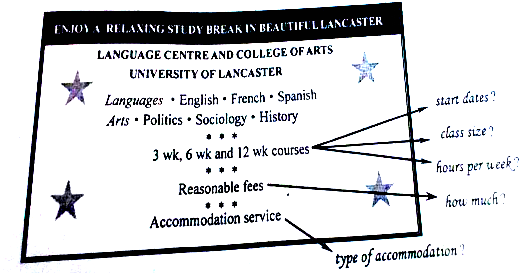题目内容
10.My daughter was a shy child,not a joiner.My memories of her early years involve me gently urging her to try (41)A activities,like bouncing teddies with other kids at playgroup.When she was four,she attended her first class in the local gymnastic club's recreational program.She loved her lessons,and I loved taking her there.When she showed friends what she could do,she showed (42)B.Two years later,a new teacher (43)A.She was a perfectionist,and I felt(44)C when she complained about my daughter's careless form.The harder she pushed,the less(45)D my kid was.I decided to chat with the teacher after one class and thought I saw something in her face:she didn't like my daughter.(46)C I didn't register for the next term.
The decision troubled me for (47)D.I suggested rejoining a later session,but my daughter quietly(48)B.Then,one day when she was about 13,she cried unexpectedly:"I wanted to stay in that gymnastics class!I (49)B wanted to quit!"
I was shocked.Had I misread the situation?Did I keep my daughter from working it out on her own terms?I shared my (50)D with a child and family expert."You have to respect that she doesn't want to do all the things you want to do,"Kolari told me.
(51)A we talked,I realized I'd ignored all the activities my daughter followed on her own.She taught (52)C to knit (编织) at eight and quickly surpassed me in skill.She can program a computer.Her (53)B always impressed me,so why did I always keep thinking about group activities?
(54)B there's one truth to a tight-scheduled child,it's that parents involve themselves too much in their kids'activities.I did make one(55)D when my daughter reached high school:she had to take a music class.Right around that time,she (56)D a friend's guitar.She (57)C a band and learned drums,then guitar.But (58)D of this required my encouragement.
"If your child is (59)C home because they're afraid of failure,it's worth (60)B them,"Kolari says.
| 41.A.group | B.society | C.club | D.class |
| 42.A.sadness | B.pride | C.impatience | D.disappointment |
| 43.A.took over | B.took in | C.took after | D.took back |
| 44.A.satisfied | B.amazed | C.annoyed | D.puzzled |
| 45.A.touched | B.invited | C.concerned | D.inspired |
| 46.A.But | B.Even | C.So | D.Ever |
| 47.A.hours | B.days | C.months | D.years |
| 48.A.accepted | B.declined | C.yelled | D.agreed |
| 49.A.seldom | B.never | C.sometimes | D.often |
| 50.A.happiness | B.regrets | C.sorrows | D.worries |
| 51.A.As | B.Since | C.Whenever | D.Before |
| 52.A.myself | B.himself | C.herself | D.themselves |
| 53.A.ideas | B.talents | C.marks | D.actions |
| 54.A.Since | B.If | C.While | D.Although |
| 55.A.suggestion | B.advice | C.explanation | D.rule |
| 56.A.turned up | B.put up | C.took up | D.picked up |
| 57.A.founded | B.organized | C.joined | D.created |
| 58.A.All | B.Some | C.Both | D.None |
| 59.A.leaving | B.heading | C.staying | D.returning |
| 60.A.watching | B.pushing | C.pulling | D.helping. |
分析 文章讲述了我害羞的女儿不爱参加团体活动,因老师不喜欢她,我武断地中止了她的体育课,后来才直到女孩不想中断,她有自己的天赋.从而我学习到家长不应该过多地干涉孩子们的活动,如果孩子是因害怕失败而不前进,我们可以适当逼迫一下.
解答 41-45 ABACD 46-50 CDBBD 51-55 ACBBD 56-60 DCDCB
41 A.考查名词的辨析.根据文章倒数第三段的 why did I always keep thinking about group activities"我为何总是想着团体活动呢",可知我一直在鼓励女儿尝试团体活动,故选A.
42 B.考查名词的辨析.根据前一句的She loved her lessons 她喜欢她的课程,可知她展示出她的骄傲.故选B.
43 A.考查动词词组的辨析一个新的老师接管.take over 接管,故选A.
44 C.考查形容词的辨析.老师抱怨女儿的粗心行为,我感到烦恼,故选C.
45 D.考查形容词的辨析.她越施压,孩子表现得越不令人满意,故选D.
46 C.考查连词的辨析.老师不喜欢我的女儿,所以我下学期没有再报名,故选C.
47 D.考查名词的辨析.根据下文的女儿哭着说没想过放弃,可知这个决定困扰了我好多年,故选D.
48 B.考查动词的辨析.根据下文的:"I wanted to stay in that gymnastics class!我想留在体育班里,可知女儿拒绝了,故选B.
49 B.考查副词的辨析.根据前一句的:"I wanted to stay in that gymnastics class!可知女儿没想过中断,用never表示"从没".故选B.
50 D.考查名词的辨析.前面的Had I misread the situation?Did I keep my daughter from working it out on her own terms?都是"我"的担忧,故选D.
51 A.考查连词的辨析.在我们讨论的时候,我意识到我忽略了我女儿自己参加的活动,故选A.
52 C.考查反身代词的辨析.她教会她自己编织,she对应的反身代词是herself,故选C.
53 B.考查名词的辨析.她的天赋总是给我留下深刻印象,故选B.
54 B.考查连词的辨析.如果说一个日程排满的孩子有一个真相,用if引导条件状语从句,故选B.
55 D.考查名词的辨析.我做出一个决定,make a rule 制定一个规定.故选D.
56 D.考查动词词组的辨析.她捡起一个朋友的吉他.pick up 捡起,获得,不费力地学会.
57 C.考查动词的辨析.她加入一个乐队.加入乐队用join a band.故选C.
58 D.考查代词的辨析.她学习吉他,加入乐队,学习打鼓,都没有需要我的鼓励,故选D.
59 C.考查动词的辨析.如果你的孩子因为害怕失败而待在家里.故选C.
60 B.考查动词的辨析.值得逼迫他们.故选B.
点评 本题是人物故事类的完形填空.这一题材是高考常考的内容,它注重考查考生对整体文章的理解和把握,要求考生从语篇及语境两个方面并结合所学知识做出正确的选择.

 鸿图图书寒假作业假期作业吉林大学出版社系列答案
鸿图图书寒假作业假期作业吉林大学出版社系列答案When Stephen Guyer's three children were growing up,he told them stories about bow his grandfather,a banker,(36)B all in the 1930s,but did not lose sight of what he valued most.In one of the darkest times(37)Ahis strong-minded grandfather was nearly(38)C,he loaded his family into the car and(39)D them to see family members in Canada with a (40)D,"there are more important thins in life than money."
The(41)A took on a new meaning recently when Mr.Guyer downsized to a(42)Bhouse from a more expensive and comfortable one.He was(43)Dthat his children,a daughter,15,and twins,22,would be upset.To his surprise,they weren't(44)C,their reaction echoed (共鸣) their great-grandfather's.What they (45)B was how warm the people were in the house and how (46)Aof their heart was accessible.
Many parents are finding family stories have surprising power to help children(47)Dhard times.Storytelling expects say the phenomenon reflects a growing(48)Cin telling tales,evidenced by a rise in a storytelling events and festivals.
A university(49)Aof 65families with children aged from 14 to 16 found kids'ability to (50)B parents'stories was linked to a lower rate of anger and anxiety.
The (51)Dis telling the stories in a way children can(52)C.We're not talking here about the kind of story that (53)C,"When I was a kid,I walked to school every day uphill both ways,barefoot in the snow."Instead,we should choose a story suited to the child's (54)A,and make eye contact (接触) to create"a personal experience",.We don't have to tell children(55)B they should take from the story and what the moral is."
| 36.A.missed | B.lost | C.forgot | D.ignored |
| 37.A.when | B.while | C.how | D.why |
| 38.A.friendless | B.worthless | C.penniless | D.homeless |
| 39.A fetched | B.allowed | C.expected | D.took |
| 40.A.hope | B.promise | C.suggestion | D.belief |
| 41.A.tale | B.agreement | C.arrangement | D.report |
| 42.A.large | B.small | C.new | D.grand |
| 43.A.surprised | B.annoyed | C.disappointed | D.worried |
| 44.A.Therefore | B.Besides | C.Instead | D.Otherwise |
| 45.A.talked about | B.cared about | C.wrote about | D.heard about |
| 46.A.much | B.many | C.little | D.few |
| 47.A.beyond | B.over | C.behind | D.through |
| 48.A.argument | B.skill | C.interest | D.anxiety |
| 49.A.study | B.design | C.committee | D.staff |
| 50.A.provide | B.retell | C.support | D.refuse |
| 51.A.trouble | B.gift | C.fact | D.trick |
| 52.A.perform | B.write | C.hear | D.question |
| 53.A.means | B.ends | C.begins | D.proves |
| 54.A.needs | B.activities | C.judgments | D.habits |
| 55.A.that | B.what | C.which | D.whom |
| A. | was | B. | had been | C. | has been | D. | will be |
| A. | breathe | B. | really | C. | pleasure | D. | heaven | ||||
| E. | breathe | F. | really | G. | pleasure | H. | heaven |
 请用英语写一篇120-150词左右的短文,简要描述漫画内容,并结合实际,对漫画主题发表自己的感想.参考词汇:重点班-key class.
请用英语写一篇120-150词左右的短文,简要描述漫画内容,并结合实际,对漫画主题发表自己的感想.参考词汇:重点班-key class.